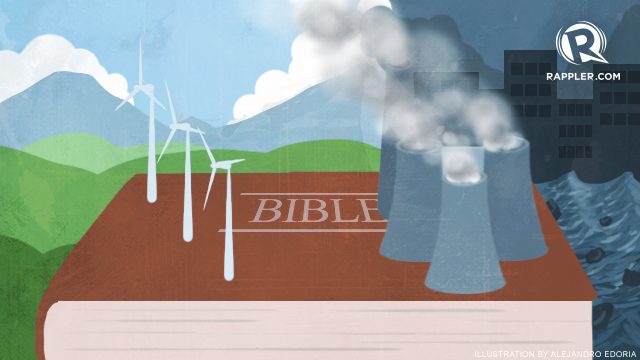SUMMARY
This is AI generated summarization, which may have errors. For context, always refer to the full article.
 According to the Book of Genesis, God created woman and man in his own image and likeness. He appointed them as his regents and gave them dominion over the earth, but they later proved to be disobedient. So God destroyed the world by returning it to its pre-creation state of watery chaos.
According to the Book of Genesis, God created woman and man in his own image and likeness. He appointed them as his regents and gave them dominion over the earth, but they later proved to be disobedient. So God destroyed the world by returning it to its pre-creation state of watery chaos.
Putting aside the arguments on whether the flood narrative is true or not, it is quite terrifying to think that what we have today appears to be a reenactment of the Genesis.
Mankind has found its dominance to be a justification to exploit the world’s resources – apparently with the aim to propel economic growth, even at the expense of environmental degradation.
Since the Industrial Revolution from two centuries ago, our relentless pursuit of economic expansion has brought us many helpful technologies, mostly powered by dirty energy from oil and gas. This is compunded by other harmful human activities such as clearing forests, fertilizing crops, and storing waste in landfills. These activities contribute largely to the emission of greenhouse gases, causing global warming.
Ultimately, all these change the climate.
PH gov’t, a hypocrite
In a country so immensely affected by climate change, it is ironic how the Philippines continues to fuel its economy by burning coal.
Only recently, Energy Secretary Carlos Jericho Petilla announced that 23 new coal-fired power plants would be established in the country by 2020.
In the next 5 years, the new coal plants that are expected to come online are:
- Davao City, 2016: 300-megawatt (MW) plant of Therma South Incorporated, a wholly-owned subsidiary of Aboitiz Power Corporation
- Quezon, 2017: 400-MW expansion of Team Energy’s Pagbilao coal-fired power plant
- Subic, Zambales, 2018: 600-MW Redondo Peninsula Energy Incorporated plant
- Davao, 2017: San Miguel Corporation’s 300-MW
- Bataan, 2016: Globaland’s 600-MW plant in Bataan
Facilities also include the two power plants from Meralco Power Gen. These are the 1,200-MW Atimonan and the 500-MW San Buenaventura coal-fired power plants in Quezon, both lined up for 2018.
The Alcantara Group’s Alsons Power is also expected to operate to produce an additional 282-MW by 2016 to meet the growing demand for electricity in Mindanao. Ayala Corporation’s AC Energy Holdings, Incorporated also acquired a 50% interest in South Luzon Thermal Energy Corporation, which is constructing a 270-MW coal plant in Batangas in partnership with Trans Asia Oil and Development Corp.
“The Philippines is contradicting itself when it says it wants a strong agreement in climate change yet is allowing the proliferation of new coal power plants,” said Senator Loren Legarda, chair of the Senate committee on climate change.
By continuously embracing the use of dirty energy from fossil fuels, the Philippines is only making a bizarre spectacle of itself when it calls on other countries to reduce their carbon emissions.
Rise of the renewables

Renewable energy is now being seen by many people around the world as a cost-effective solution for developing countries like the Philippines.
Renewable energy is, in fact, a more affordable energy source than coal for many of the world’s poor countries.
“Four out of 5 people without electricity live in rural areas that are often not connected to a centralized energy grid, so local, renewable energy solutions offer a much more affordable, practical and healthy solution than coal,” said Simon Bradshaw, Oxfam Australia’s climate change policy advisor.
This supports statements made this year by the World Bank, the International Monetary Fund, and former UN secretary-general Kofi Annan. They have all argued that renewable energy, not fossil fuels, is key to improving energy access and reducing inequality, especially in developing countries.
In fact, according to Christine Lins, Executive Secretary of the Renewable Energy Network for the 21st Century, “if you look back 10 years ago, renewable energies were providing 3% of global energy, and now, they provide something close to 22%, so that has really sky-rocketed.”
This is spearheaded by countries like Uruguay, which aims to generate 90% of its electricity from renewable sources by 2015, and Costa Rica, which maintained 100% renewable energy generation for the first 100 days of this year.
These countries are not alone and are fast becoming the new normal rather than the alternative. Even small developing countries like Burundi, Jordan, and Kenya are investmenting in renewable energies as a percentage of the gross domestic product (GDP).
Dominion over earth
In a matter as complex as climate change, morality seems to play no role. Yet the consequences we now face prove otherwise.
Heat waves, climate-sensitive diseases, severe drought are happening because of the world’s changing climate patterns. All these are closely linked to our attitude towards nature.
We should not mistake our dominance over other creatures as a free pass to exploit the limited resources of our common home. We don’t really own this planet; we are mere stewards responsible of taking care of it. It is our mission to leave it to the future generations in a much better state than we found it.
If we keep on subscribing to the culture of indifference and inaction, then we can expect to see the worse in the near future. The impacts of climate change are already as devastating as they are.
Following the plot of the Genesis narrative, one wonders as to what degree or magnitude they can be in the course of some 5 or 10 years from now. Well, I can only imagine. – Rappler.com
Roy Joseph Roberto is 24-year-old enginner who is part of #Call4Climate, a worldwide online writing campaign on Climate Change.
Add a comment
How does this make you feel?
There are no comments yet. Add your comment to start the conversation.